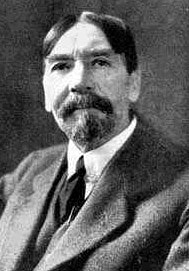I recently reposted my 2008 review of Herve Kempf’s book How the Rich Are Destroying the Earth. That review included a short appendix on Thorstein Veblen’s 1899 book The Theory of the Leisure Class, which Kempf says explains today’s economic and environmental crises.

Thorstein Veblen
In my view, Veblen’s book was “one of the best works of social criticism of his time,” but its “attempts at scientific explanation didn’t make much sense in 1899 and have not aged well.”
That prompted vigorous criticism from Michael Dawson, author of the excellent book The Consumer Trap. In his view I was “seriously unfair to Veblen,” whom he called a “towering thinker.”
While agreeing that The Theory of the Leisure Class is “by far his worst book,” Dawson wrote that “leftists should not allow liberals ownership of Veblen, and should read him often and carefully. ”
My response was that I was discussing the book Kempf based his argument on, not offering a summation of Veblen’s entire life’s work. “I do not accept that any criticism of Veblen must be offset by a declaration hailing him as a genius.”
This week, another writer whose work I greatly admire published a paper that he presented at a recent symposium on Veblen. Like me, Michael Perelman says that “Veblen directed his merciless criticism at the material and cultural defects of capitalism rather than the existing social relations underlying capitalism.”
Within that framework, Perelman’s overall assessment of Veblen’s work is very positive — he calls his cultural critique “unparalleled in the English speaking world,” and says that “Thorstein Veblen has become more relevant than ever, given current conditions.”
I stand by my criticism of The Theory of the Leisure Class, but Perelman’s paper, which focuses on Veblen’s later work, provides a more balanced assessment. Download: Thorstein Veblen: An American Economic Perspective (PDF).
Perelman maintains the excellent blog Unsettling Economics. His recent books include The Confiscation of American Prosperity and The Invisible Handcuffs of Capitalism.
Ian
—



Thanks for the link. In talking about the motives and methods of class domination (sabotage, deception, force, overt and covert coercion, etc.) in such widely comparative anthropological terms, I’d say Veblen went quite far toward linking the exploitation process to its behavioral roots. Nothing to sneeze at there. Also, a very powerful and persuasive way of explaining why capitalism remains a class society, despite its long-standing claim to the contrary.
But, in order to get at this work, you have to read things like _The Instinct of Workmanship_.
Ian – I was wondering if you’ve read or heard of one Guido
Preparata who would seem to be Veblen’s strongest advocate? In Preparata’s
books “Conjuring Hitler” and “The Ideology Of Tyranny” he has praised Veblen to
the skies and, in the latter book, has even called for a “Veblenian Left” which
would have been “immune to the rigid, and unfulfilled, schematisms of Marxism”.
Preparata’s view of 20th Century history is, to
say the least, somewhat unconventional. He thinks that, as well as deliberately
incubating Nazism, the “Anglo-American clubs” also engineered the Russian
revolution – both manoeuvres being attempts to keep Germany and Russia
separate.
I’m not familiar with him, but a quick read of the introduction to his Hitler book indicates that “unconventional” is a mild word for his views.